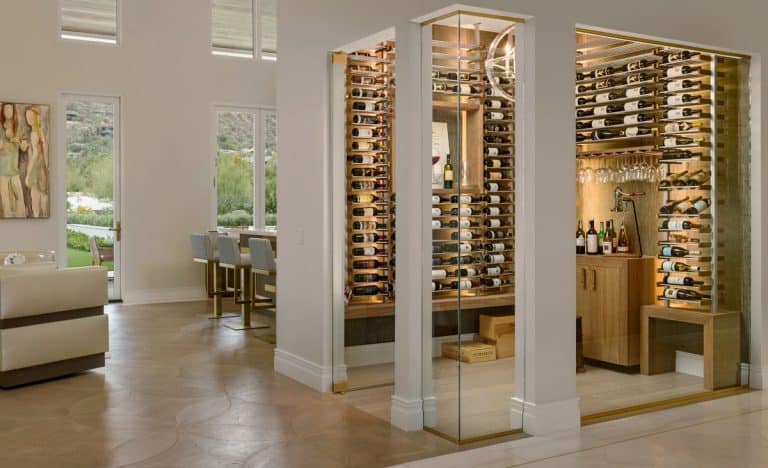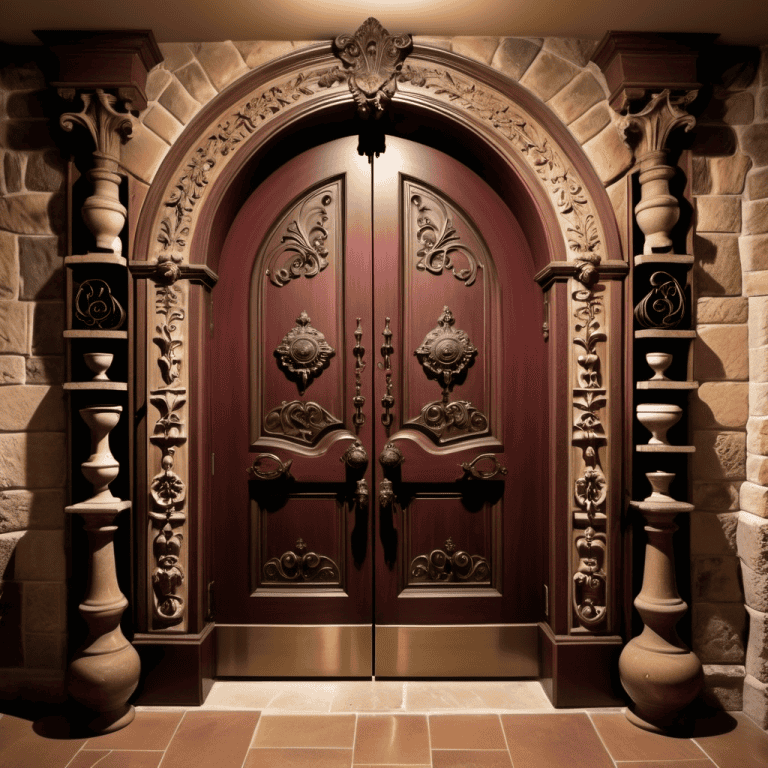As a wine enthusiast, I’ve learned the importance of proper wine storage through personal experience. There are some key differences to understand regarding the wine fridge vs regular fridge question.
Storing your wine collection in the right environment is essential for preserving its quality and flavor. Let me share my insights to help you make the best choice for your wine storage needs.
Welcome to Didi Somm, and Cheers!
Important Notice: The information in this article is for general and public information purposes only. It solely reflects Didi Somm’s or his Staff’s opinion, and no responsibility can be assumed for errors or omissions in the service’s contents. For details, please check the Disclaimer at the bottom of the homepage.

Main Takeaways
Understanding Wine Storage Options
When I first started collecting wine, I didn’t realize the significance of proper storage. I kept my white wine bottles in a regular fridge and the red wine on a wooden rack in the living room. In addition to the issue with the serving temperatures -the whites were too cold and the reds too warm – I noticed the flavors were not developing as expected, and some corks had dried out.
That’s when I began researching various wine storage options and learned about the benefits of wine fridges. Unlike a regular refrigerator, which lacks humidity control and has generally low and fluctuating temperatures, a wine fridge maintains a consistent environment for storing wine.
I also considered a beverage cooler, which offers adjustable temperature settings and compartments for various beverages. However, I found that wine fridges are specifically designed to cater to the unique storage needs of wine, with optimal temperature settings and humidity control that ordinary beverage coolers do not provide. Beverage coolers can be helpful for short-term storage, e.g., preparing your wines before serving at a party, etc.
Wine Cooler vs Wine Fridge: What’s the Difference?
One common question is, “What’s the difference between a wine cooler and a wine fridge?” While both are designed specifically for storing wine, there are some distinctions:
Wine coolers are often smaller and more affordable than wine fridges.
Wine fridges typically have more advanced features like precise temperature and humidity control.
Both maintain consistent conditions better than regular fridges.
A wine cooler refrigerator offers an ideal temperature range for wine storage, which is 45 to 65 degrees, while a standard refrigerator’s range of 35° to 42° is considered too cold for wine
Key Features of Wine Fridges
Wine refrigerators have several key features that make them ideal for storing wine. They come in various sizes, from countertop to upright cabinet models, and include features like adjustable temperature settings and dual-zone, multi-zone cooling.
Temperature Control and Precision
Wine refrigerators provide a range of 45°F to 65°F, perfect for different types of wine, and emphasize the importance of precise temperature control.
Set to a specific temperature for optimal storage conditions
Internal fans distribute air evenly for consistent temperature
I love customizing the temperature based on the type of wine I’m storing.
Humidity and Vibration Control – Optimal Conditions
- The humidity level is controlled to maintain the integrity of the cork
- Vibration is minimal to protect bottles from disturbance
I’ve found that the proper humidity and vibration control make a noticeable difference in the long-term quality of my wines.
Storage Design and Capacity
Purpose-built horizontal shelving for wine bottles to minimize vibration and maximize space
Sliding rails that maximize space and minimize vibration
Range of sizes to accommodate various collection sizes
- Adjustable shelving to store different bottle shapes and sizes (depending on the model)
The thoughtful design of wine fridge shelving is a game-changer. However, I recommend carefully checking your specific requirements when selecting a wine fridge.
Benefits of Wine Fridges
Investing in a wine fridge has brought numerous benefits to my wine-collecting journey: For those with larger collections, a wine cellar cooling unit can create the best storage conditions, whether in a dedicated wine cooler (e.g., big cabinet type) or a custom-built wine cellar.
Ideal Conditions for Wine Aging
- Optimal temperature, humidity, and vibration control
- Allows for proper long-term storage, aging, and flavor development
I’ve been able to age some special bottles for years in my wine fridge, and the flavors are incredible when I finally pop the cork.
Flexibility and Convenience
It can be placed anywhere in your home (but there are “dos and don’ts” – please check for details in my recent blog article, The Art of Wine Storage: 30 Best Tips to Preserve Your Wines.
Come in various sizes and styles for different collections and spaces.
Include various types of wine fridges, such as freestanding, built-in, and under-counter types, suitable for different settings.
I love the flexibility of integrating my wine fridge into my living space and admiring my collection.
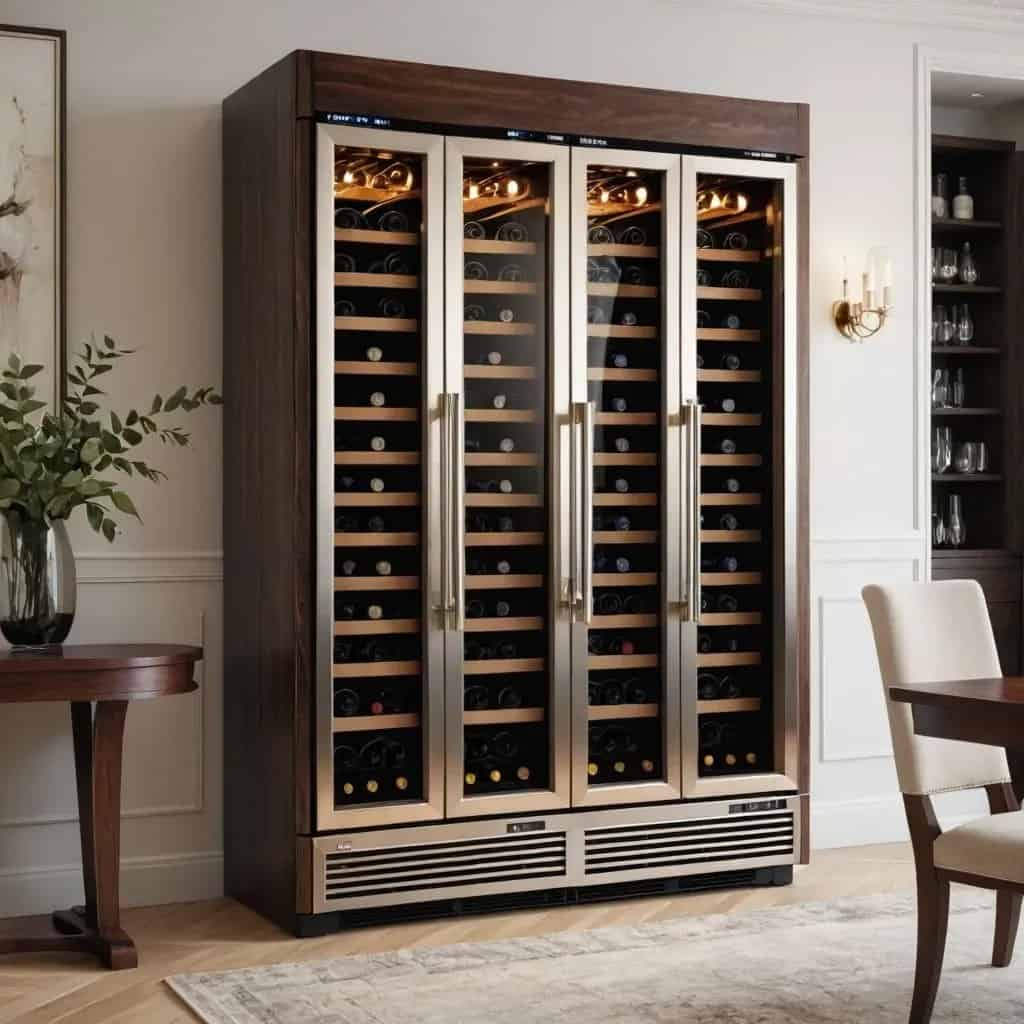
Limitations of Regular Fridges
Using a regular refrigerator for wine storage can degrade the wine’s quality due to factors like low humidity levels and the intrusion of other food odors.
Temperature Fluctuations and Lack of Humidity Control
- Not designed for wine storage, too low and fluctuating temperatures
- Lack of humidity control, drying out corks, and affecting the flavor of your wine
- Not suitable for long-term wine storage
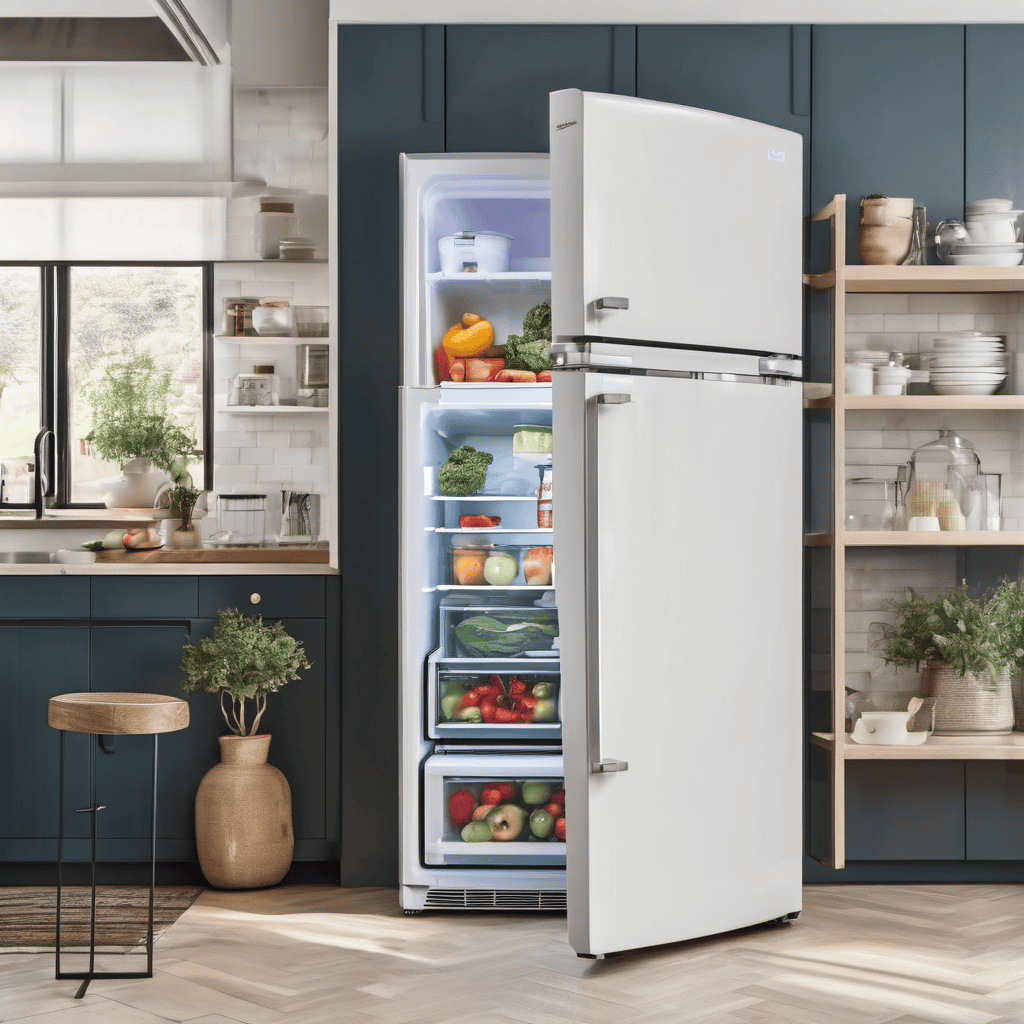
How to Choose the Right Option?
Consider Your Wine Collection Size and Type
- A wine cooler may suffice for a small collection and short-term storage horizon
- A wine fridge or cellar may be necessary for an extensive collection and long-term storage
- Some wines require specific storage conditions
My Experience: As my collection has expanded, I’ve grown my storage setup from a small wine cooler to a large wine fridge.
Budget and Space Constraints
- Wine coolers are often more affordable than wine fridges
- Consider your available space and collection size
- Wine fridges and cellars can be a significant but worthwhile investment
Balance of Budget, Space & Storage Needs
I view my wine fridge as an investment in my passion for wine collecting, but I recognize it’s a balance of budget, space, and wine storage needs.
FAQs – wine fridge vs regular fridge
1. Can I store wine in a regular beverage fridge?
It’s not ideal for long-term storage due to temperature fluctuations and lack of humidity control. A regular beverage refrigerator can dry out corks and negatively impact the wine flavor.
2. What’s the ideal temperature for storing wine?
The ideal range is 45°F to 65°F, depending on the type of wine. Consult the winemaker’s recommendations or check my recent blog article, The Art of Wine Storage: 30 Best Tips to Preserve Your Wines.
3. How does humidity affect wine storage?
Humidity levels around 50-70% are ideal to keep corks moist and prevent air from entering the bottle. Low humidity can dry out corks, while high humidity can cause mold.
4. Why is vibration control important for wine storage?
Vibration can disturb the sediment in wine and disrupt the aging process. Wine fridges have minimal vibration compared to regular fridges.
5. Can I store red and white wines together?
Yes, as long as the temperature and humidity accommodate both. Many wine fridges have dual zones or multi-temperature zones for this purpose.
6. How long can I store wine in a wine fridge?
It depends on the type of wine, but a wine fridge provides optimal conditions for long-term storage. Some wines can age for decades.
7. Do I need a wine fridge for short-term storage?
A wine fridge is ideal for any storage duration, but a wine cooler can suffice if you plan to drink the wine within a few months.
8. Are wine fridges energy efficient?
Yes, most wine fridges are designed with energy efficiency in mind, as they are meant to run continuously.
9. Can I store other beverages in a wine fridge?
It’s best to use a wine fridge exclusively for wine to avoid introducing food odors and flavors that can taint the wine.
10. How much does a reasonable wine fridge cost?
Prices vary based on size and features but expect to spend at least a few hundred dollars on a quality wine fridge. High-end models can cost several thousand dollars.
11. Should wine bottles be stored vertically or horizontally?
Horizontal storage is best to keep the cork moist and prevent air from entering the bottle. Vertical storage can dry out corks over time.
12. Can I store opened bottles of wine in a wine fridge?
Yes, a wine fridge can help prolong the life of an opened bottle, but for optimal taste, it’s best to consume it within a few days.
13. What is the lifespan of a wine fridge?
Proper maintenance can extend the life of a wine fridge to 10-15 years or more. Look for models with good warranties.
14. Do I need a wine fridge if I don’t collect expensive wines?
A wine fridge is beneficial for storing any wine you want to age or preserve, regardless of price point. Even modestly priced wines can benefit from optimal storage.
15. Can I build a wine cellar instead of buying a fridge?
A custom wine cellar can be a luxurious option for serious collectors with ample space and budget. However, wine fridges offer convenience and flexibility for most wine enthusiasts.
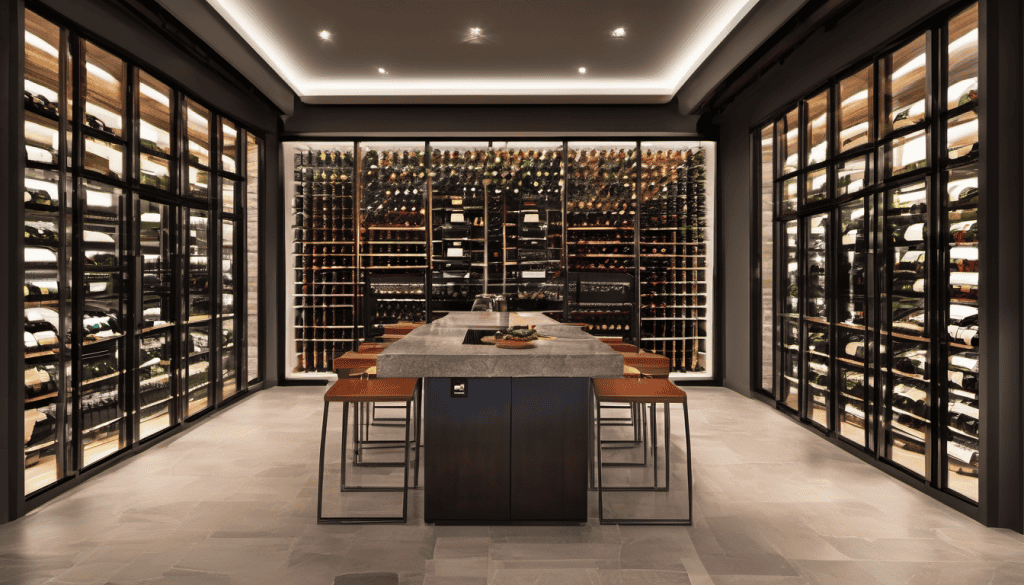
For wine enthusiasts, the question of “wine fridge vs regular fridge” has a clear answer. Wine fridges provide the optimal storage conditions to preserve and age your wine collection, with precise temperature, humidity, and vibration control.
Conclusion
Regular fridges can’t compare and can even damage your wine over time.
When deciding between a wine cooler, wine fridge, or regular fridge, consider your wine collection size, storage duration, available space, and budget. Don’t forget to factor in the potential long-term benefits of a wine fridge, as it can protect your wine investment for years to come.
I have experienced the difference firsthand and highly recommend investing in a quality wine fridge. I bought a sizeable Eurocave wine fridge over 15 years ago, and I don’t regret it – it still works perfectly.
Enjoy your wine collection, and cheers!
For your reference, the latest articles by Didi Somm include:
- How to Use a Wine Opener? – 7 Best Tips You Must Know
- Best Red Wine For Cooking – All You Need To Know
- How Much Does a Bottle of Wine Weigh? – Find Out Here
- What Does Wine Taste Like? – Find Out Here
- Expert Talk: Wine Bottle Sizes – All You Should Know
- What is a Sweet Wine? – 7 Expert Insights
Important Notice: The information in this article is for general and public information purposes only. It solely reflects Didi Somm’s or his Staff’s opinion, and no responsibility can be assumed for errors or omissions in the Service’s contents – for details, please check the Disclaimer at the bottom of the homepage.





